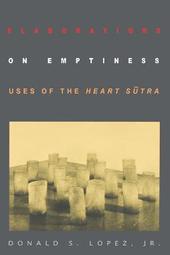
|
Elaborations on Emptiness: Uses of the Heart Sutra
Paperback / softback
Main Details
| Title |
Elaborations on Emptiness: Uses of the Heart Sutra
|
| Authors and Contributors |
By (author) Donald S. Lopez
|
| Physical Properties |
| Format:Paperback / softback | | Pages:280 | | Dimensions(mm): Height 254,Width 197 |
|
| Category/Genre | Non-western philosophy
Buddhism |
|---|
| ISBN/Barcode |
9780691001883
|
| Classifications | Dewey:294.382 |
|---|
| Audience | | Professional & Vocational | | Tertiary Education (US: College) | |
|---|
|
Publishing Details |
| Publisher |
Princeton University Press
|
| Imprint |
Princeton University Press
|
| Publication Date |
8 November 1998 |
| Publication Country |
United States
|
Description
"The Heart Sutra" is one of the most famous Buddhist texts, traditionally regarded as a potent expression of emptiness and of Buddha's perfect wisdom. This book explores the elaborate philosophical and ritual uses of "The Heart Sutra" in India, Tibet and the West. It includes full translations of the eight extant Indian commentaries, and translations of six essays that examine the unusual roles that "The Heart Sutra" has played - as a mantra, an exorcism text, a tantric meditation guide and material for comparative philosophy. The translations, taken together, demonstrate why commentary is as central to modern scholars on Buddhism as it was for Buddhists in ancient times.
Author Biography
Donald S. Lopez, Jr., is Professor of Buddhist and Tibetan Studies in the Department of Asian Languages and Cultures at the University of Michigan. He is the editor of Princeton Readings in Religions, which includes Religions of China in Practice, Buddhism in Practice, Religions of India in Practice, and Religions of Tibet in Practice.
Reviews"Elaborations on Emptiness is a superb achievement: It is by far the best and most complete treatment of the Heart Sutra in any Western language."--Jay Garfield, Journal of Buddhist Ethics "[This] is a superb achievement: It is by far the best and most complete treatment of the Heart Sutra in any Western language."--Journal of Buddhist Ethics
|